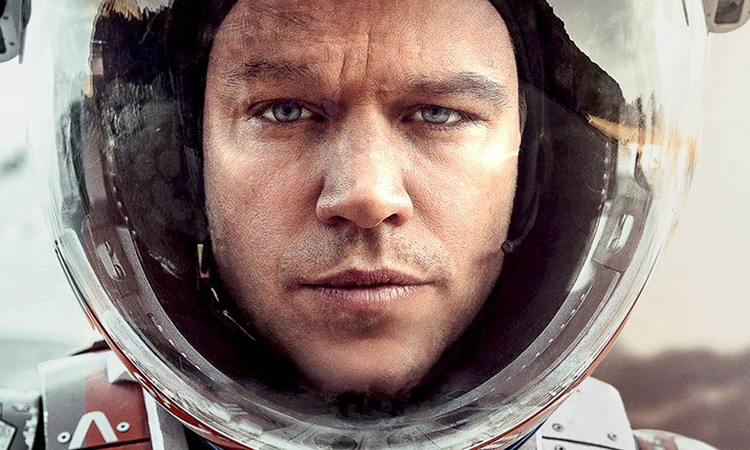 When I was ten years old, I got stuck on my bike in an underpass, the cacophony of mighty traffic racing above me, the choice of three tunnels in front adding to the sense of dislocation. Three was worse than one, because it meant I was twice as likely to take the wrong path. I remember the feeling of cold and isolation and confusion and terror. It was just a bike ride near my house, but I might as well have been in outer space. Everyone has had the experience of being lost, and “losing it” as a result. I expected that Ridley Scott and Drew Goddard’s film The Martian, in which Matt Damon is stranded on the red planet, would evoke similar feelings. There’s so much opportunity for awe (at the planet), empathy (with the main character), and being impressed (at the ingenuity of his and NASA’s combined attempts at getting him home).
When I was ten years old, I got stuck on my bike in an underpass, the cacophony of mighty traffic racing above me, the choice of three tunnels in front adding to the sense of dislocation. Three was worse than one, because it meant I was twice as likely to take the wrong path. I remember the feeling of cold and isolation and confusion and terror. It was just a bike ride near my house, but I might as well have been in outer space. Everyone has had the experience of being lost, and “losing it” as a result. I expected that Ridley Scott and Drew Goddard’s film The Martian, in which Matt Damon is stranded on the red planet, would evoke similar feelings. There’s so much opportunity for awe (at the planet), empathy (with the main character), and being impressed (at the ingenuity of his and NASA’s combined attempts at getting him home).
But I found The Martian to be strangely numb to its own possibilities. The casting doesn’t help. Matt Damon has been lost in cinema before—behind enemy lines in Normandy in Saving Private Ryan, and a distant unnamed planet in Interstellar, so his presence as The Martian seems like a stunt. He paints his character (Mark Watney) as believably cocky, but there’s never any sense of threat, nor appreciation of the gravity of what being alone on Mars might feel like. It’s hard to take seriously a film in which the first human being to be stranded on another planet doesn’t spend at least a little bit of time experiencing a sense of wonder.
If I was stuck on another planet, I think I would probably feel at least a little bit afraid some of the time, and that some other times that fear would give way to a sense of awe about the fact that I’m stuck on another planet. Some other times I might even think that these two feelings might be good to put in a movie if they ever made one about my predicament, being the only human ever stuck alone on another planet and all that. But then that wouldn’t leave enough time for people in the NASA scenes to explain astrophysics to each other. Those actors—Jeff Daniels, Chiwetel Ejiofor, and Kristen Wiig, as well as those on the spacecraft aiming to save Matt—Jessica Chastain and Michael Peña among them, are having fun, but not much more than that.
Nonetheless, science fiction often confuses pomposity with transcendence; so it’s nice to see a space movie telling a story not about destructive evil genius, but about the kind of cleverness that creates. The Martian does offer a vision of problem-solving that gives some hope for human beings collaborating for the common good. This involves potatoes and geopolitics, and in a movie full of things we’ve seen in other movies, it is the potatoes and geopolitics that feel most unfamiliar. I don’t think there’s been a Hollywood blockbuster before in which human waste is composted to produce healthy food that keeps a man alive. (I’m willing to bet that some organic gardens will be initiated here on earth as a result. An unintentional outcome, but a welcome one.) The rescue mission depends on cooperation between China and the U.S., whose space agencies decide to ignore political protocol for the sake of science. It’s a vote in favor of acknowledging there are some things that matter more than commerce.
Alas, The Martian squanders the potential it also had to contain within its enormous scale a small film about the interior life of a lonely person, whose salvation depends on two otherwise mutually suspicious superpowers working together. It’s regrettable that the film offers only the most superficial sketch of the interior life of its protagonist—we never quite see past Watney’s slightly aloof, jokey demeanor.
Scott, the director of Alien, Blade Runner, and Thelma & Louise knows how to tell stories that invite us into the consciousness of another, but The Martian doesn’t seem interested in what’s going on inside Mark Watney’s head. (See the 1972 film Silent Running for a film more interested in the loneliness of space.) Yet growing potatoes has never looked so miraculous, nor the relationship between China and the U.S. so humane. The Martian is at its best when it’s about human beings experiencing necessity as the mother of invention, facing their problems and imagining something new. You might come away from it thinking that Mars itself isn’t all that exciting, but people? Well, that’s something to write home about.
To find out about Rose’s thoughts on how to live a happier life, click here


